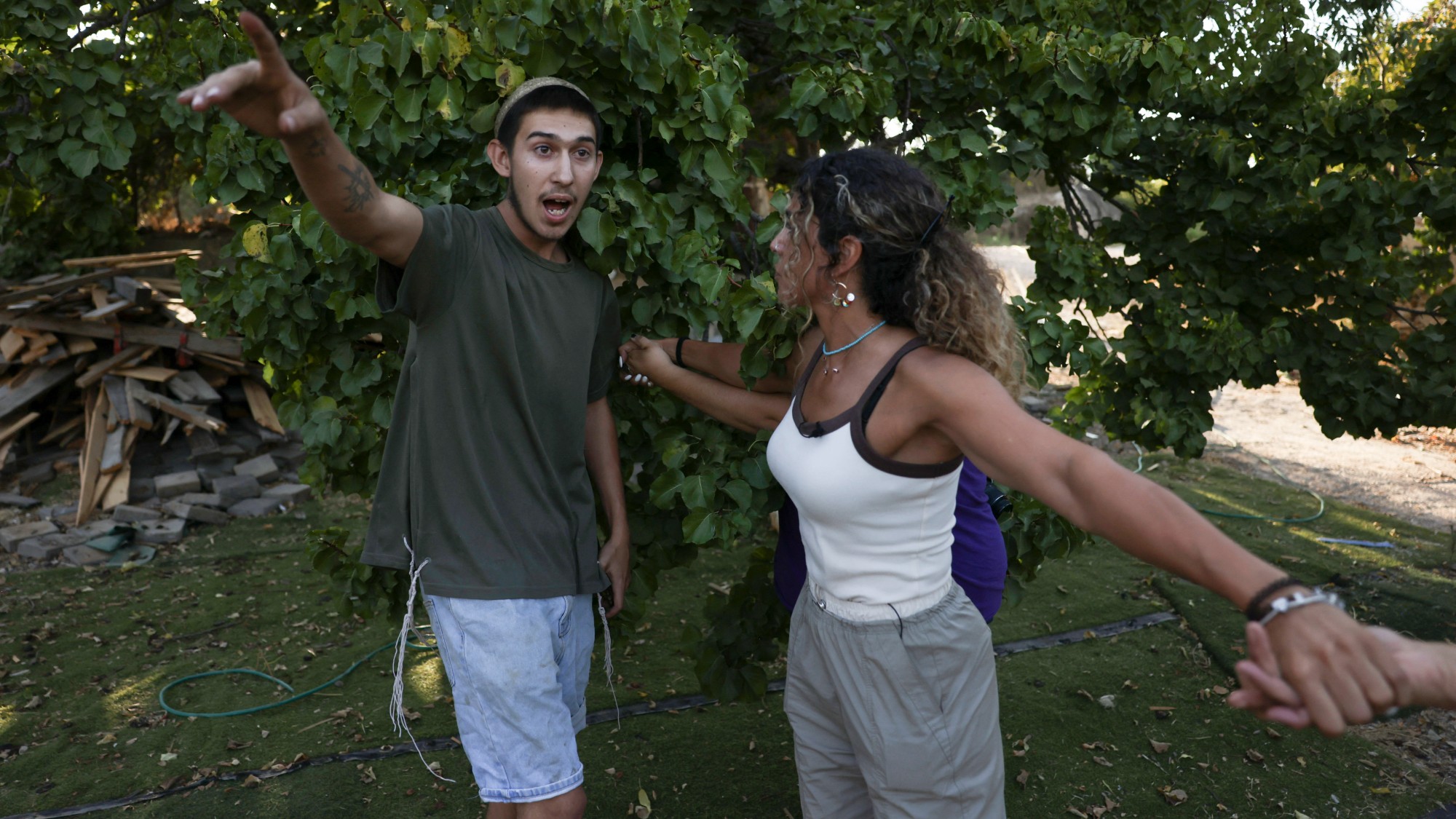Will new Israeli settlers remain in West Bank?
Violence and land grabs against Palestinians in occupied territories have risen since 7 October attacks

A free daily email with the biggest news stories of the day – and the best features from TheWeek.com
You are now subscribed
Your newsletter sign-up was successful
Israel said its forces killed five Palestinian "terrorists" in the West Bank this morning, following the deaths of 10 Palestinians yesterday as the Israeli military launched raids across the occupied territory.
The violence has refocused attention on the area as fears grow that Israeli settlers are using the Gaza war as an opportunity to seize more land in the West Bank.
What did the commentators say?
The UN reported on 20 August that "on average, at least one Palestinian has been killed every day" so far this month by Israeli airstrikes on the West Bank. And since the 7 October attacks by Hamas, "20 Israeli outposts have sprung up and 18 Palestinian communities have been forced out of ancestral villages", said Christina Lamb in The Sunday Times.
The Week
Escape your echo chamber. Get the facts behind the news, plus analysis from multiple perspectives.

Sign up for The Week's Free Newsletters
From our morning news briefing to a weekly Good News Newsletter, get the best of The Week delivered directly to your inbox.
From our morning news briefing to a weekly Good News Newsletter, get the best of The Week delivered directly to your inbox.
By "changing facts on the ground", as they describe it, settlers "hope to move enough Israelis on to the land" and "build enough on it" to "make their presence irreversible", said Yolande Knell and Toby Luckhurst on the BBC. Their "long-term hope is that Israel formally annexes the land".
Since the start of the war in Gaza, there has been an "acceleration" in settlement growth in the West Bank and extremists in Israel's government "boast" that these changes will prevent an independent Palestinian state. It is feared that the settlers and their supporters in government want to "prolong the war in Gaza to suit their goals".
More than 700,000 Israelis live in about 130 settlements among 2.7 million Palestinians, but the "land grab has never been so open", said Lamb.
Many in the region believe that Israel has "opened a second front" in the West Bank, a territory that is a "dystopian world of razor-wire fences, signs warning Do Not Enter, armed lookouts and checkpoints, sometimes blaring music into neighbourhoods".
A free daily email with the biggest news stories of the day – and the best features from TheWeek.com
The settlers' mission is "becoming increasingly violent", said The Economist, and settler violence in the West Bank has "increased sharply" since Hamas’s attack on Israel on 7 October. Despite Palestinians being forced to flee a number of small villages in remote parts of the West Bank, there have only been "a handful" of arrests.
The war in Gaza has "emboldened" settlers because the fighting has "accelerated the creeping influence" of settlers over the army, and "provided a smokescreen" for "further land-grabs" in the West Bank.
Several government ministers are "hell-bent on using relentless – and often violent settler expansion to create a 'greater Israel' all the way to the Jordan river", said Donald Macintyre on the i news site.
What next?
The United States has announced new sanctions on settlers in the West Bank and urged its ally Israel to bring greater accountability. "Extremist settler violence" in the West Bank "causes intense human suffering, harms Israel's security and undermines the prospect for peace and stability in the region", said a US State Department spokesman.
So far, Israel's Prime Minister Benjamin Netanyahu has "ruled out restoring Jewish settlements in Gaza", but he "remains beholden" to far-right parties who are "working to make settlements in the West Bank irreversible", said the BBC.
Chas Newkey-Burden has been part of The Week Digital team for more than a decade and a journalist for 25 years, starting out on the irreverent football weekly 90 Minutes, before moving to lifestyle magazines Loaded and Attitude. He was a columnist for The Big Issue and landed a world exclusive with David Beckham that became the weekly magazine’s bestselling issue. He now writes regularly for The Guardian, The Telegraph, The Independent, Metro, FourFourTwo and the i new site. He is also the author of a number of non-fiction books.
-
 Why are election experts taking Trump’s midterm threats seriously?
Why are election experts taking Trump’s midterm threats seriously?IN THE SPOTLIGHT As the president muses about polling place deployments and a centralized electoral system aimed at one-party control, lawmakers are taking this administration at its word
-
 ‘Restaurateurs have become millionaires’
‘Restaurateurs have become millionaires’Instant Opinion Opinion, comment and editorials of the day
-
 Earth is rapidly approaching a ‘hothouse’ trajectory of warming
Earth is rapidly approaching a ‘hothouse’ trajectory of warmingThe explainer It may become impossible to fix
-
 Should the EU and UK join Trump’s board of peace?
Should the EU and UK join Trump’s board of peace?Today's Big Question After rushing to praise the initiative European leaders are now alarmed
-
 ‘The forces he united still shape the Democratic Party’
‘The forces he united still shape the Democratic Party’Instant Opinion Opinion, comment and editorials of the day
-
 ‘Those rights don’t exist to protect criminals’
‘Those rights don’t exist to protect criminals’Instant Opinion Opinion, comment and editorials of the day
-
 ‘The mark’s significance is psychological, if that’
‘The mark’s significance is psychological, if that’Instant Opinion Opinion, comment and editorials of the day
-
 ‘Bad Bunny’s music feels inclusive and exclusive at the same time’
‘Bad Bunny’s music feels inclusive and exclusive at the same time’Instant Opinion Opinion, comment and editorials of the day
-
 ‘The West needs people’
‘The West needs people’Instant Opinion Opinion, comment and editorials of the day
-
 ‘The censorious effect is the same, even if deployed covertly’
‘The censorious effect is the same, even if deployed covertly’Instant Opinion Opinion, comment and editorials of the day
-
 Is the Gaza peace plan destined to fail?
Is the Gaza peace plan destined to fail?Today’s Big Question Since the ceasefire agreement in October, the situation in Gaza is still ‘precarious’, with the path to peace facing ‘many obstacles’